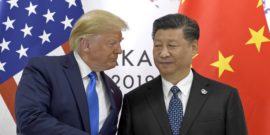A strategy of détente with Russia and China would buy the United States time to rebuild its technological and military capabilities.
Pass Fast-Track Legislation for the Trans-Pacific Partnership
As one of its first acts, the Republican Congress should give President Obama fast-track authority for the Trans-Pacific Partnership, a proposed trade agreement between the United States and most important Asian nations with the exception of China. This free trade zone can help boost economic growth and help balance growing Chinese power in Asia. Negotiations have been ongoing for some time, but fast-track is needed to throw them into high gear.
Under fast-track authority, Congress suspends its rules and guarantees the President an up or down vote on a trade agreement that meets certain conditions. These provisions can help the agreement succeed by preventing interest groups from picking it apart. When the United States uses fast-track authority, other nations are more likely to summon the political will to make concessions in negotiations. They would understandably be less willing to negotiate an agreement that is likely to be amended in the United States Congress or, even worse, defeated after being amended in way that upsets the delicate balance needed to assure final passage. Because most other nations have parliamentary systems where the government has a majority to pass the agreements they sign, they do not need to invoke fast-track authority themselves to help bring the U.S. to the table.
Some people object to fast-track authority because it is antidemocratic. This argument is specious. Fast-track is passed by a majority of both Houses of Congress and signed by the President. There is nothing sacrosanct about a particular set of procedural rules. Congress can certainly alter its regular order to help international trade agreements succeed in the face of geopolitical challenges. In the end, any agreement will still have to command majority legislative support in both Houses.
Today the geopolitical need for the Trans-Pacific Partnership is greater than ever. Just this week, China got permission from an Asian forum to explore a free trade zone that could rival the Partnership. The Chinese initiative is more likely to succeed if the United States dawdles. The current situation resembles the period after the Second World War, when the United States was engaged in a faceoff with the Soviet Union. We strengthened the position of the West by encouraging the European Economic Community and initiating the General Agreements on Tariffs and Trade to increase economic growth among its allies and bind them politically together.
Economists worry that regional free trade zones can simply divert trade, shrinking trade with countries outside the free trade area in favor of trade within it. Regional pacts are thus less economically efficient than global agreements. But for more than a decade, the current round of world trade talks has failed to make meaningful progress —delayed most recently by India’s refusal to agree to modest measures that would streamline customs and other red tape that create barriers to exchange. Within this context, concluding the Partnership may actually boost the chances for more productive global agreements for two reasons. First, it will create a greater commonality of interests among those within the Partnership, making their demands in global trade negotiations converge. Second, increasing economic growth in Asia may put more pressure on nations like India that fear being left behind.
Fast-track is one area of largely common ground between the new Congress and the President. It would be a good way to begin the New Year.


